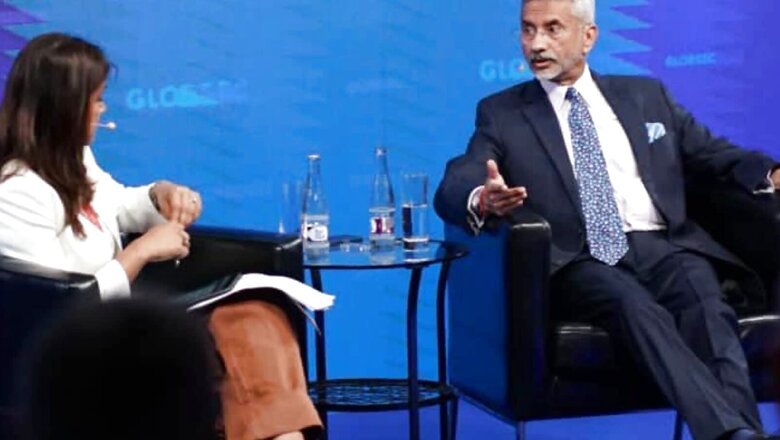
views
Even if at the risk of repeating himself over and over again, India’s Minister of External Affairs Dr Subrahmanyam Jaishankar has never minced his words while highlighting Western hypocrisy in the wake of the Russia-Ukraine war. This time again, at the GlobeSec 2022 Bratislava Forum, Dr Jaishankar played on the front foot and slammed Western perspectives on India’s foreign policy. Not only did he hold up the mirror to Europe and asserted India’s right to make choices based on its own interests, but he also ended his remarks with the remark that “the world cannot be that Euro-centric as it used to be in the past,” highlighting an inevitable reality that fails to dawn on most foreign policy enthusiasts in the West. He also rejected a recent Wall Street Journal report on India and explained India’s position on its wheat export ban.
Speaking to the interviewer who persisted agonisingly with the same narrative about India’s stand on the war in Europe and the fact that it’s buying Russian oil at a discount, Dr Jaishankar said, “Europe has to grow out of the mindset that Europe’s problems are the world’s problems, but the world’s problems are not Europe’s problems.” But this was not all, the discussion is an eye-opener for anyone who is still not convinced of the merits of India’s stand. At this point, even a ten-year-old could grasp the crux of India’s arguments.
It cannot be stressed enough that Dr Jaishankar is the most iconic foreign minister India has ever had. Armed with unshakable confidence and sharp eloquence, without being bogged down by the noise, and to the frustration of India’s detractors, he presents complex aspects of India’s foreign policy with great ease and sheer logic disagreeing with which would only be a fool’s resort. Dr Jaishankar makes all the more difference in a changing world where India’s interests depend deeply on shaping a multilateral world order.
Holding Up the Mirror to Europe
Starting with the West’s main axe to grind with India, the interviewer asked Dr Jaishankar how he tied non-alignment with nine times more oil imports from Russia to which he retorted, “I don’t see a non-alignment-oil connection at all.” He highlighted that Europe is still buying Russian gas and how the new package of sanctions against Russia are designed in a way in which consideration has been given to the welfare of the population. “So, pipelines have a certain carve-out and timelines have been given. It’s not like tomorrow morning everything is going to be cut off. So, people need to understand if you can be considerate of yourself, surely you can be considerate of other people.
Interrupting the minister, the interviewer persisted, “How do you not conflate the two, I mean I know the Indian-Russian relationship is strong but you also have issues with China. How do you then sit back and define Indian Foreign policy at this point where the West seems to be quite vociferous in trying to curtail the war in Ukraine whereas by purchasing this oil for national interest, India is being asked, are you funding this war?”
Dr Jaishankar hit back with a smile on his face, “I don’t want to sound argumentative, tell me buying Russian gas is not funding the war? It’s only Indian money and oil coming to India which funds but not gas coming to Europe which funds.. let’s be a little even-handed out here.
Where is Iranian and Venezuelan oil?
On the narrative that India’s oil imports from Russia have gone up nine times, Dr Jaishankar reasoned that it has gone up from “a very low base because at that time markets were open.” He went on to point out a largely undiscussed fact in the West, “If countries in Europe, and the West and the United States are so concerned, why don’t they allow Iranian oil to come into the market? Why don’t they allow Venezuelan oil to come into the market? I mean they’ve squeezed every other source of oil we have and then say okay guys you must not go into the market and get the best deal for your people. I don’t think that’s a very fair approach.
Also Read: India’s Stance on Ukraine Leaves West Scrambling As Jaishankar Calls Out Hypocrisy, Slams China
Dr Jaishankar also “politely” declared inaccurate a Wall Street Journal article claiming that India is involved in trans-shipment of Russian oil. “Whoever wrote that knows trans-shipping means?” He said, adding, “A country like India would be crazy to get oil from somebody and sell it to somebody else, I mean this is nonsense.”
Sitting on my own ground
India has made it awfully clear that it would fend for its own interests and not crumble under pressure from the West’s “with us or against us” policy. But the interviewer tried one more time to impose a burnt-out Western perspective with a twist. “Mr Jaishankar, there will always be two axes, it’s an understood accepted fact, that you have the west, U-led, and you have China as the next potential axis. Where does India fit into this?” She asked.
He hit back, “Sorry, that is exactly where I disagree with you. This is the construct that you are trying to impose on me and I don’t accept it… I am one-fifth of the world’s population, I am the fifth or sixth-largest economy in this world, forget the history/civilisation bit, everyone knows that.
He went on to assert that India was entitled to have its own side, weigh its own interests, make its own choices and that the choices will not be cynical or transactional, will be a balance of India’s values and its interests. “There is no country in the world which disregards its interests.
She pushed again, “Sitting on the fence is not an option to be a world leader.”
“I don’t think we are sitting on a fence just because I don’t agree with you.. it means I’m sitting on my ground,” Dr Jaishankar retorted.
Securing wheat
On India’s ban on wheat exports, insinuating that India had a hand in triggering the global food crisis, the interviewer made a rather provocative statement, “The Global South and the east being squeezed by Russian issues with allowing Ukrainian grains to be exported but with India doing the same aren’t those weakest people in the world being subjected to the same kind of issues from India.”
Dr Jaishankar’s explanation, however, was watertight. He said that people do not understand India’s perspective because they are not tracking the trade. He clarified that not only has India been exporting wheat, but it performed exceptionally well last year when it exported 7 million tonnes and that this year before the heat wave struck the nation, the expectation was to export substantial amounts of wheat. “The Prime Minister himself said on many occasions that we see there is a food crisis in the world and we would like to be of help,” he pointed out but stated that when the Modi government “saw the kind of run on our wheat, a large part of it by international traders based out of Singapore and to some degree, Dubai” the actual result was that low-income countries— India’s traditional buyers like Bangladesh, Nepal and Sri Lanka, the Gulf states and impoverished nations like Yemen and Sudan, were being squeezed out. He pointed out that the wheat was actually being stocked for being traded and that India’s goodwill was being used for speculation, and so that had to be stopped. “Because it was also impacting us at home, our prices were going up.
“We’re not going to give speculators an open access to the Indian market so that Indian customers and the LDCs of the world get the short end of that,” he said. India is still open to government-to-government deals and has exported wheat to 23 countries this year. Scoffing at the West’s poor record of ensuring the affordability of vaccines and that they reached poorer nations on time, he also remarked, “Curtailing speculation and preventing a diversion to higher-income countries with a greater possibility to buy because what we saw happen with the vaccines, we don’t want to see happen with wheat.”
Read all the Latest Opinions here













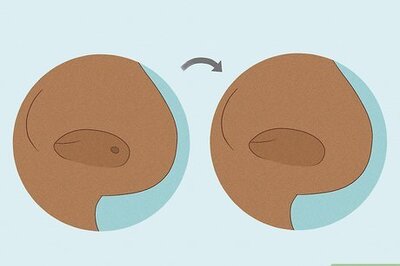


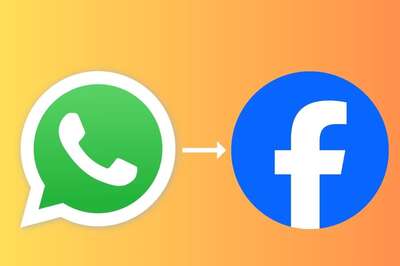
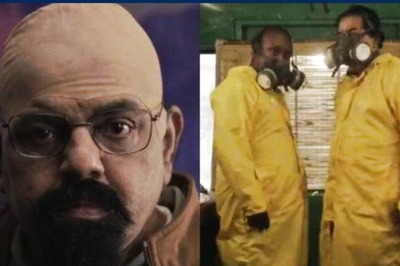
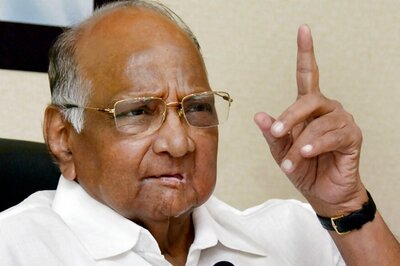
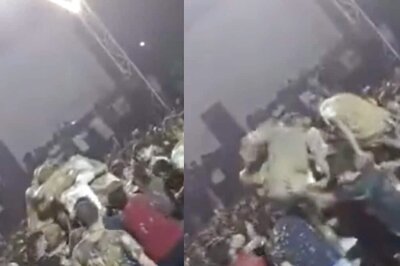
Comments
0 comment